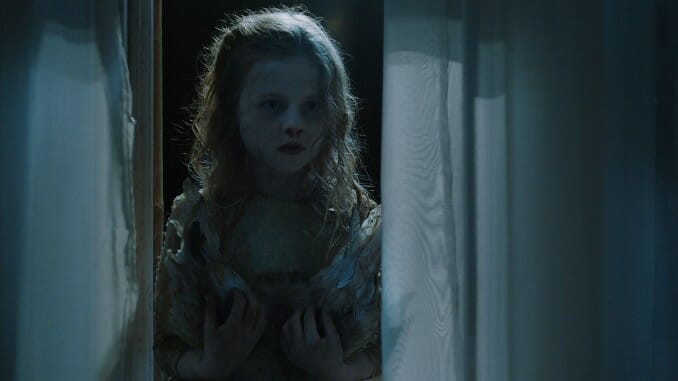Ghostly Mood Piece Martyrs Lane Plays a Familiar Game

The idea of ghosts walking the mortal plane as living memories that can either be embraced or denied at the psychological peril of those they haunt gets a lot of play in the horror world. It’s Gothic tradition. When eerie movies deal with damage to the soul rather than the Devil’s lust for it, or want to take a softer approach to the spirits stuck with us because of various woes, we tend to get these kinds of beckoning specters more inclined to send you to therapy than the Ghostbusters. Martyrs Lane, from writer/director Ruth Platt, treads along the same path, as quietly and tangibly as translucent curtains in the breeze. It’s a thin haunt, its fable examined too closely to retain its magic and without enough detail to truly satisfy, but its capacity with mood keeps it innocuous if not particularly revelatory.
The feeling it generates is one of foreboding wonder: The real world with the lights on holds the nonsensical pain and half-neglect of a youngest’s childhood, while the creaking dark of night offers secret answers. Obviously, little Leah (Kiera Thompson) was going to pull the threads and see where they go, even if they weren’t given to her by a greyish girl (Sienna Sayer) wearing costume angel wings that she meets in a graveyard. Nothing weird about that. Definitely someone to befriend. The relationship between the pair develops as they meet each night, as Leah opens her bedroom window to let what she hopes is the right one in. Each night offers a step forward in the mystery started by Leah’s consuming and relatable desire to peer inside a closed locket—the mystery of why Leah’s distant mother (Denise Gough) and loving-yet-busy father (Steven Cree) always seem a bit at each other’s throats; the mystery of why her bratty teen sister (Hannah Rae) bullies her so badly.
It’s not an especially vexing thinker, nor is it one deeply couched in the specific emotions of its family dynamic. Platt’s script draws the getting-by family—who live in a vicarage and drop a Bible verse/story here and there—lightly through incident, until a finale spells everything out for the slowpokes. The story’s main strength lies in its structure. The nightly visitations, which each feature the game Two Truths and a Lie, and the increasingly dreadful, pitiable aura exuded by Sayer (excellent and unnerving, able to flip between teasingly fun and creepy in an instant) give it that fairy tale feeling of uneasy repetition and doomed development. My, grandmother, what a big nose you have.
-

-

-

-

-

-

-

-

-

-

-

-

-

-

-

-

-

-

-

-

-

-

-

-

-

-

-

-

-

-

-

-

-

-

-

-

-

-

-

-








































